Scripta Instituti Donneriani Aboensis is a publication series published by the Donner Institute for research in Religious and Cultural History in Åbo, Finland. The aim of the institute, which is attached to the Foundation of Åbo Akademi University, is to conduct and promote scholarly research in the field of religion.
Archives - Page 2
-
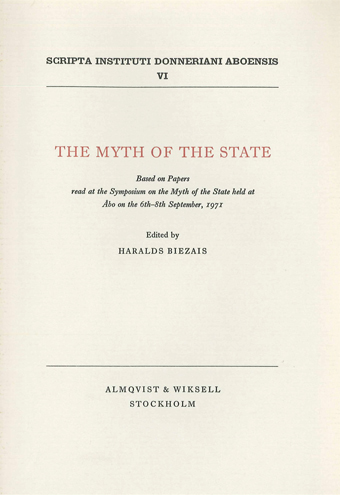
The Myth of the State
Vol. 6 (1972)The current volume examines myths of the state from ancient to modern time and from various cultural and religious contexts. It opens with a theoretical attempt to define the concept of myth followed by an analysis of the Durkheimian position on the topic under study. Notions of the state, politics and prophecy in the Old and the New Testament are presented as well as several pre-historic myths of the state from e.g. ancient Egypt, the Roman Empire and the pre-Christian German tradition. Furthermore, Islamic as well as Orthodox Christian theories of the state are illuminated. As a conclusion, a comparison is made between different political systems from both East and West concerning the influence of myth and religion.
The volume is based on papers read at the Symposium on the Myth of the State held at Åbo on the 6th-8th September, 1971. Ed. by Haralds Biezais. Stockholm : Almqvist & Wiksell, 1972
-
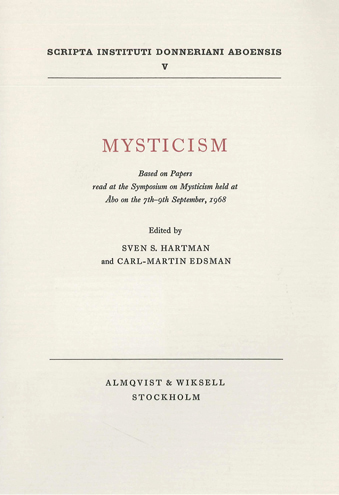
Mysticism
Vol. 5 (1970)Mysticism has been a central part of the study of religion in the Nordic countries since the groundbreaking works of Tor Andrae and Nathan Söderblom were published in the early twentieth century. In this volume, based on a symposium on mysticism held at the Donner Institute in 1968, several of the leading scholars of religion of the time present their research on mysticism from historical, psychological, theological and linguistic points of view. Among the authors are found e.g. Hjalmar Sundén, Holger Tesleff, Birgit Klockars, Wilho Rinne and Åke V. Ström. Mysticism is highlighted in a historical as well as in a contemporary context and the difficult question of 'faith and reason' – in its present variant of 'mysticism and scholarship' – is challenged and discussed.
The volume is based on papers read at the Symposium on Mysticism held at Åbo on the 7th-9th September, 1968. Ed. by Sven S. Hartman and Carl-Martin Edsman. Stockholm : Almqvist & Wiksell, 1970.
-
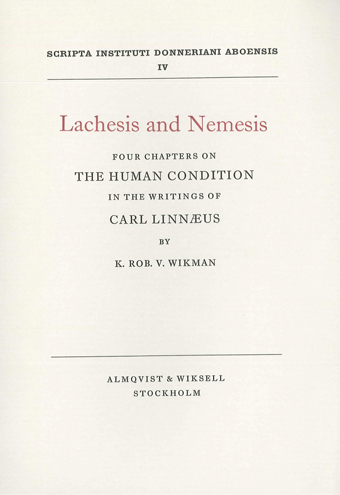
Lachesis and Nemesis: four chapters on the human condition in the writings of Carl Linnaeus
Vol. 4 (1970)The current volume consists of essays written by Prof. K. Rob V. Wikman, dealing with the Swedish 18th century botanist and zoologist Carl Linnaeus (Carl von Linné). The texts focus on Linnaeus’ ideas of natural magic and their intimate connection to his opinions of the natural condition of humanity and divine retribution in this life – a theme that had not been investigated previously. Furthermore, the elements of folklore in the writings of Linnaeus, his moral and social attitudes and his philosophical heritage are highlighted in the essays. For Linnaeus, the Hellenic mythical figures of Lachesis and Nemesis function as symbols for his views about human life and conduct.
-
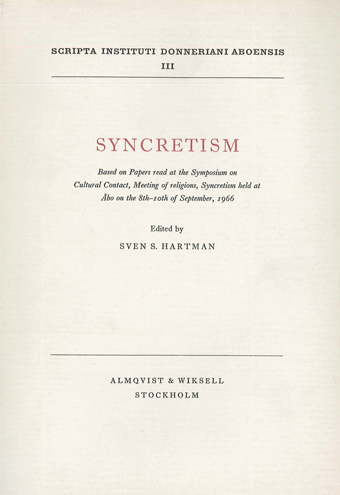
Syncretism
Vol. 3 (1969)In 1966, the Donner Institute arranged a symposium on the theme “Cultural Contact, Meeting of Religions, and Syncretism”. In this volume, papers read at the conference are published under the editorship of Sven S. Hartman. Syncretism is often regarded as a problem by the historian of religion, but the volume presents a more varied understanding of how religions mingle and meet, clash and conflict.
Themes presented in the volume range from foreign influences in African religions to syncretistic traits in Old Norse religion and from Christian elements in Japanese Buddhism to Mandean versions of Old and New Testament figures. Several leading scholars of religion of the time are found among the contributors, e.g. Helmer Ringgren, Åke Hultkrantz, Olof Petterson, Åke V. Ström and Jan Bergman.
The volume is based on papers read at the Symposium on cultural contact, Meeting of religions, Syncretism held at Åbo on the 8th-10th of September, 1966. Ed. by Sven S. Hartman. Stockholm : Almqvist & Wiksell, 1969.
-
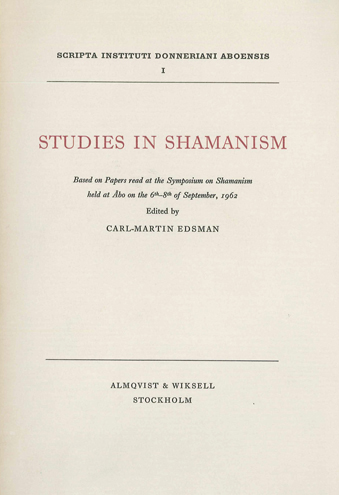
Studies in Shamanism
Vol. 1 (1967)This inaugural volume of the publication series Scripta Instituti Donneriani Aboensis is based on the very first symposium arranged by the newly founded Donner Institute, arranged in 1962 on the topic of Shamanism. The symposium gathered scholars from the Nordic countries to discuss current research on Shamanism from historical, psychological, methodological and folkloristic points of view. The empirical scene covers the entire world, from Swedish folk religion to indigenous peoples of the Americas and from Hungary to Nepal.
The volume also includes a very important introductory article by the first director of the Institute, Prof. Helmer Ringgren, presenting the institute, its foundation and research policies as well as its aims for the future concerning both research activities and the library upheld by the institute.
The volume is based on papers read at the Symposium on Shamanism held at Åbo on the 6th-8th of September, 1962. Ed. by Carl-Martin Edsman. Stockholm : Almqvist & Wiksell, 1967.
-
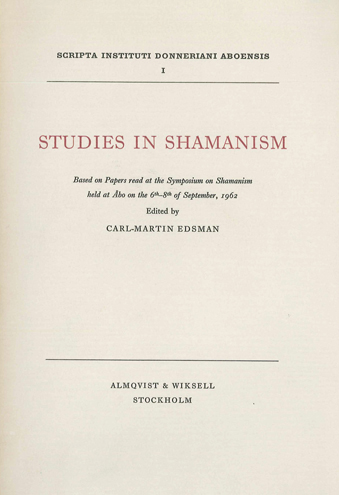
Fatalistic Beliefs in Religion, Folklore, and Literature
Vol. 2 (1967)Religions are often thought to help human beings to adjust themselves to the realities of life, to give them an understanding of what happens – i.e. to enable them to relate in some way to what they regard as their fate or destiny. This volume strives to analyse attitudes towards destiny in a systematic way, focusing on the interrelation of fatalism with other aspects of faith and belief in several religious traditions.
Some of the articles show how the alternatives God, fate, and chance overlap in a series of blended forms. Other texts focus on the spectrum of beliefs regarding destiny and their place in different religions: ranging from a feeling of total dependence to the proud conviction that man is the architect of his own fortune, from pessimistic resignation to heroic defiance or positive acceptance of one’s fate.
The volume is based on papers read at the Symposium on Fatalistic Beliefs held at Åbo on the 7th-9th of September, 1964. Ed. by Helmer Ringgren. Stockholm : Almqvist & Wiksell, 1967.










